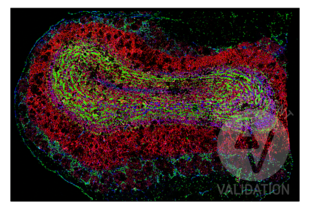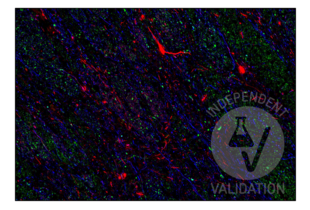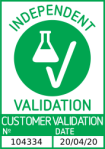Cortactin anticorps (N-Term)
-
- Antigène Voir toutes Cortactin (CTTN) Anticorps
- Cortactin (CTTN)
-
Épitope
- N-Term
-
Reactivité
- Humain
-
Hôte
- Lapin
-
Clonalité
- Polyclonal
-
Conjugué
- Cet anticorp Cortactin est non-conjugé
-
Application
- Western Blotting (WB), Immunofluorescence (IF), Immunohistochemistry (Paraffin-embedded Sections) (IHC (p)), Immunocytochemistry (ICC)
- Réactivité croisée
- Humain, Souris, Rat
- Attributs du produit
-
Rabbit Polyclonal antibody to Cortactin (src substrate cortactin)
Cortactin antibody [N1], N-term - Purification
- Purified by antigen-affinity chromatography.
- Classe de qualité
- KO Validated
- Immunogène
- Carrier-protein conjugated synthetic peptide encompassing a sequence within the N-terminus region of human Cortactin. The exact sequence is proprietary.
- Isotype
- IgG
-
-
- Indications d'application
- WB: 1:500-1:3000. ICC/IF: 1:100-1:1000. IHC-P: 1:100-1:1000. Optimal dilutions/concentrations should be determined by the researcher. Not tested in other applications.
- Commentaires
-
Positive Control: NIH-3T3 , JC , PC-12 , mouse brain , rat brain , HeLa
Validation: KO/KD
- Restrictions
- For Research Use only
-
- by
- Akoya Biosciences
- No.
- #104334
- Date
- 20.04.2021
- Antigène
- Cortactin
- Numéro du lot
- 39568
- Application validée
- Multiplex Immunohistochemistry
- Contrôle positif
Fresh frozen mouse olfactory bulb
- Contrôle négative
Unlabeled control (mouse fresh frozen)
- Conclusion
Passed. The anti-cortactin antibody ABIN2854674 produces high degrees of labeling in granular and external plexiform layers of the mouse olfactory bulb. Additional labeling can be observed in the neuropil of individual glomeruli which is consistent with staining of synapses and neuronal processes.
- Anticorps primaire
- ABIN2854674
- Anticorps secondaire
- Full Protocol
- Protocol details are described in the Akoya Biosciences CODEX® User Manual (see https://www.akoyabio.com/wp-content/uploads/2021/01/CODEX-User-Manual.pdf).
- Tissue preparation as outlined in the Akoya Biosciences CODEX® User Manual fresh-frozen tissue protocol.
- Conjugation of the anti-cortactin ABIN2854674 antibody to an oligo barcode used to bind oligo-conjugated fluorophore ATTO 550.
- Notes
No signal was detected in unlabeled specimens.
Specific staining of Cortactin was also observed with human FFPE cortical tissue sections with both citrate antigen retrieval and EDTA antigen retrieval.
Optimal staining and signal to noise ratios were obtained if tissue was pre-treated for autofluorescence removal (see https://www.akoyabio.com/wp-content/uploads/2020/07/Customer-Demonstrated-Protocol-Autofluorescence-Quenching-Mar2020.pdf).
Validation #104334 (Multiplex Immunohistochemistry)![Testé avec succès 'Independent Validation' signe]()
![Testé avec succès 'Independent Validation' signe]() Validation Images
Validation Images![Murine fresh frozen coronal olfactory bulb section (Thickness = 5 µm) labeled with anti-cortactin antibody ABIN2854674 (green; conjugated to fluorophore ATTO 550). Labeling is present in high degrees of labeling in granular and external plexiform layers with additional staining observed in the glomerular neuropil regions. Grin2b and doublecortin were labeled with ABIN5611338 (red; bound to fluorophore ATTO 550) and a doublecortin antibody (blue; bound to fluorophore AF 488).]() Murine fresh frozen coronal olfactory bulb section (Thickness = 5 µm) labeled with anti-cortactin antibody ABIN2854674 (green; conjugated to fluorophore ATTO 550). Labeling is present in high degrees of labeling in granular and external plexiform layers with additional staining observed in the glomerular neuropil regions. Grin2b and doublecortin were labeled with ABIN5611338 (red; bound to fluorophore ATTO 550) and a doublecortin antibody (blue; bound to fluorophore AF 488).
Murine fresh frozen coronal olfactory bulb section (Thickness = 5 µm) labeled with anti-cortactin antibody ABIN2854674 (green; conjugated to fluorophore ATTO 550). Labeling is present in high degrees of labeling in granular and external plexiform layers with additional staining observed in the glomerular neuropil regions. Grin2b and doublecortin were labeled with ABIN5611338 (red; bound to fluorophore ATTO 550) and a doublecortin antibody (blue; bound to fluorophore AF 488).
![FFPE normal human cortex tissue section labeled with anti-cortactin antibody ABIN2854674 (green; bound to fluorophore ATTO 550) after EDTA antigen retrieval. MAP2 and neurofilament were additionally labeled with anti-MAP2 antibody ABIN125739 (red; bound to fluorophore ATTO 550) and anti-neurofilament antibody (blue; bound to fluorophore AF488).]() FFPE normal human cortex tissue section labeled with anti-cortactin antibody ABIN2854674 (green; bound to fluorophore ATTO 550) after EDTA antigen retrieval. MAP2 and neurofilament were additionally labeled with anti-MAP2 antibody ABIN125739 (red; bound to fluorophore ATTO 550) and anti-neurofilament antibody (blue; bound to fluorophore AF488).
Protocole
FFPE normal human cortex tissue section labeled with anti-cortactin antibody ABIN2854674 (green; bound to fluorophore ATTO 550) after EDTA antigen retrieval. MAP2 and neurofilament were additionally labeled with anti-MAP2 antibody ABIN125739 (red; bound to fluorophore ATTO 550) and anti-neurofilament antibody (blue; bound to fluorophore AF488).
Protocole -
- Format
- Liquid
- Concentration
- 1 mg/mL
- Buffer
- 1XPBS ( pH 7), 20 % Glycerol, 0.025 % ProClin 300
- Agent conservateur
- ProClin
- Précaution d'utilisation
- This product contains ProClin: a POISONOUS AND HAZARDOUS SUBSTANCE which should be handled by trained staff only.
- Stock
- 4 °C,-20 °C
- Stockage commentaire
- Store as concentrated solution. Centrifuge briefly prior to opening vial. For short-term storage (1-2 weeks), store at 4°C. For long-term storage, aliquot and store at -20°C or below. Avoid multiple freeze-thaw cycles.
-
- Antigène
- Cortactin (CTTN)
- Autre désignation
- cortactin (CTTN Produits)
- Synonymes
- anticorps EMS1, anticorps 1110020L01Rik, anticorps Ems1, anticorps Cttnb, anticorps CG3637, anticorps Dmel\CG3637, anticorps cortactin, anticorps cttn, anticorps CTTN1, anticorps P85.25, anticorps Cttn, anticorps ems1, anticorps CTTN, anticorps cortactin, anticorps CG3637 gene product from transcript CG3637-RD, anticorps cortactin S homeolog, anticorps cortactin L homeolog, anticorps src substrate cortactin, anticorps Src substrate cortactin, anticorps CTTN, anticorps Cttn, anticorps Cortactin, anticorps cttn.S, anticorps cttn.L, anticorps cttn, anticorps CpipJ_CPIJ006351, anticorps Bm1_57220, anticorps LOC100533277
- Sujet
-
This gene is overexpressed in breast cancer and squamous cell carcinomas of the head and neck. The encoded protein is localized in the cytoplasm and in areas of the cell-substratum contacts. This gene has two roles: (1) regulating the interactions between components of adherens-type junctions and (2) organizing the cytoskeleton and cell adhesion structures of epithelia and carcinoma cells. During apoptosis, the encoded protein is degraded in a caspase-dependent manner. The aberrant regulation of this gene contributes to tumor cell invasion and metastasis. Two splice variants that encode different isoforms have been identified for this gene.
Cellular Localization: Cytoplasm , cytoskeleton (By similarity) , Cell projection , lamellipodium (By similarity) , ruffle (By similarity) - Poids moléculaire
- 62 kDa
- ID gène
- 2017
- UniProt
- Q14247
- Pathways
- Signalisation MAPK
-



 (1 validation)
(1 validation)



